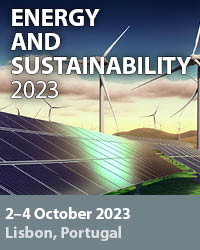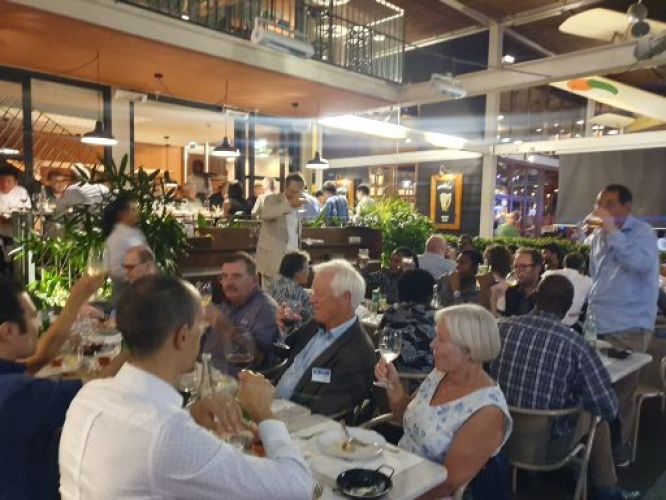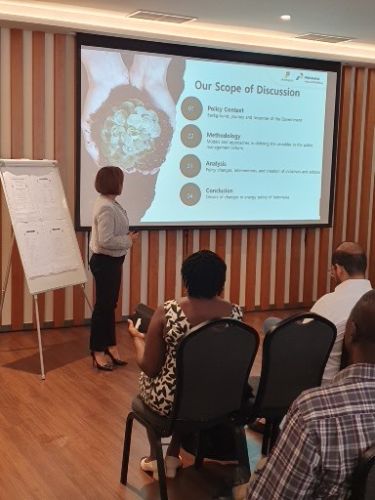Energy and Sustainability 2023
10th International Conference on Energy and Sustainability
![]()
2–4 October 2023
Lisbon, Portugal
Overview

The 10th International Conference on Energy and Sustainability took place in Lisbon, Portugal. The Conference was organised by the Wessex Institute of Technology (WIT), UK, represented by its Academic Director, Dr Stavros Syngellakis.
The conference series, which started in New Forest, UK in 2007, is well-established and always attracts a wide international spread of delegates. The diverse topics covered by the conference often require the collaboration between different disciplines in order to arrive at optimum outcomes; they include studies of energy networks, new energy resources, materials, storage solutions, waste to energy processes, smart grids and many others.
Opening of the Conference
The meeting was opened by Stavros who welcomed the delegates, then he went on to point out that “Energy and Sustainability” is one of the more successful conference series organised by the Institute. This is probably due to the broad realisation that technological and economic development, which is driven by energy, cannot anymore rely exclusively on fossil fuels. New policies, methods, procedures and technology need to be researched, tested and introduced to provide solutions that could reverse the current trends towards an uncertain future for our planet.
The main objective is to reduce and eventually eliminate emissions which have a detrimental effect on our environment. This can be achieved by either using existing energy sources more efficiently or promoting the use of renewable energy sources through technological development that would make them attractive alternatives to traditional fuels. The development of renewable energy also facilitates energy access for remote and isolated communities.
Stavros then gave a brief overview of the present WIT activities. He pointed out its origins in the pioneering work for the development of a new numerical technique, the boundary element method (BEM). This method was developed into a powerful analysis tool for the solution of critical industry problems. It is applied by itself or in combination with other analytical techniques to provide solutions against engineering failures such as, for instance, sea or atmospheric corrosion and fatigue fracture.
The scope of the institute was subsequently broadened to provide knowledge transfer opportunities in other science and engineering areas as well on the ecology and the environment. Conferences remain WIT’s main instrument for knowledge transfer; they provide opportunities for social interaction, establishing contacts, direct exchange of views, information and advice plus some enjoyable moments during social events such as the dinner and other organised activities.
The Institute also continues to organise short courses in a wide variety of topics. It welcomes proposals from academics and engineers, experts in almost any field who wish to disseminate their knowledge. Another way in which WIT achieves dissemination of knowledge is by the publication of papers from conferences through its publishing arm, WIT Press. The institute, in partnership with other academic institutions, awards annually two medals to prominent scientists in their fields. The Green medal jointly awarded with the University of Mississippi and supported by Elsevier, to a person having made significant contributions to the development of the boundary element method. The Prigogine medal was instituted with the University of Siena to the memory of Ilya Prigogine, Nobel winner in Chemistry, pioneer in linking thermodynamics to ecological processes.
Professor Carlos Brebbia was the founder and embodiment of the institute until his death in 2018. He pioneered the development of the boundary elements as a powerful analytical tool. His passing away was a great loss to everyone working with him but also to the wider academic community. His memorial was attended by many friends, fellow academics most of them, who referred to his personality and his achievements.
Invited Presentations
There were a series of invited lectures on advanced topics of research and applications, as follows:
- "Technological and energy challenges in the most vulnerable communities. A study in the state of Chihuahua, Mexico", by Dr Camilo Lozoya, Instituto Tecnologico Y De Estudios Superiores De Monterrey, MEXICO
- "Applying the level(s) indicator language to resilient housing”, by Dr Carmen Diaz Lopez, University of Seville, SPAIN
- "A new strategy to support companies in the uptake of audits measures: the audit-to- measure project", by Dr Simone Maggiore, Ricerca Sul Sistema Energetico-RSE SPA, ITALY
- "Estimated impact of CO2- and NOx -emission reduction targets on car ownership and car use in the Netherlands", by Dr Jaap Vleugel, Delft University of Technology, NETHERLANDS
- "Public views on the importance and expansion of renewable electricity production over the last 35 years in Idaho, USA" by Dr Robert Mahler, University of Idaho, USA
- "Electricity sector interactions between Norway and other European countries", by Dr Erik Jarlsby, Eureka Energy Partners AS, NORWAY
- "Quantitative characterization of advective losses in a falling particle receiver", by Dr Peter Vorobieff, University of New Mexico, USA
A number of themes were pursued by the contributors to this conference. These included:
Government policies towards a more environment-friendly management of resources; management, technology and materials for increased sustainability in energy production as well as use of renewable energy resources; strategies and technology for bringing renewable energy to remote and isolated parts of the world; strategies for increasing the efficient use of energy in industry; methods of reducing the carbon footprint from industry and agriculture; education promoting energy sustainability; strategies and technology for promoting sustainable use of energy in transport and the built environment.
There were numerous occasions for holding informal discussions during the coffee breaks and the complimentary lunches provided.
Conference Publication
Papers presented at this conference will appear in Vol. 261 of the WIT Transactions on Ecology and the Environment (ISSN 1743-3541). Papers presented at the meeting will be available Open Access in the eLibrary of the Wessex Institute (https://www.witpress.com/elibrary) from where they can be freely downloaded by any interested parties.
ISAC Dinner
The meeting of the International Scientific Advisory Committee (ISAC) of the Conference took place over dinner in Restaurant D' Bacalhau serving traditional Portuguese cuisine. At the meeting, members of the committee were encouraged to advise WIT on the evolution of the conference by making suggestions for new topics, ISAC membership and future venues.
Conference Dinner
The Conference dinner took place at Restaurant Cantinho do Avillez - Parque das Nações, where the participants could enjoy the best contemporary Portuguese cuisine, including an exceptional range of traditional starters. The restaurant offered beautiful views over the Tangus River and the nearby Vasco da Gama Bridge, the longest bridge in Europe. The evening was particularly appreciated by the participants.
Closing of the Conference
The conference was closed by Dr Stavros Syngellakis, who thanked the delegates for attending and hoped that they would consider attending the next conference in the series which is planned to be reconvened in either May or September 2025.
Related Conferences
Sustainable Development and Planning 2024






 Wessex Institute
Wessex Institute